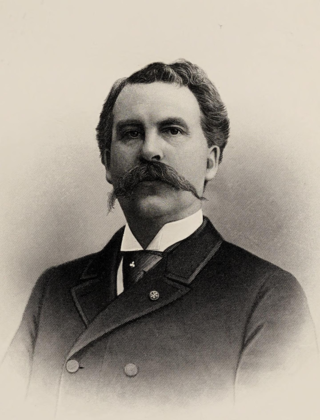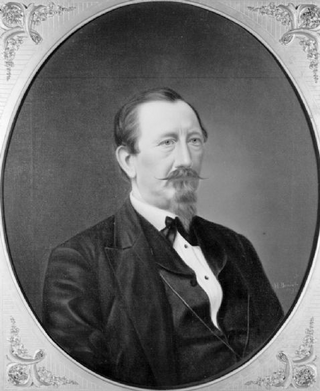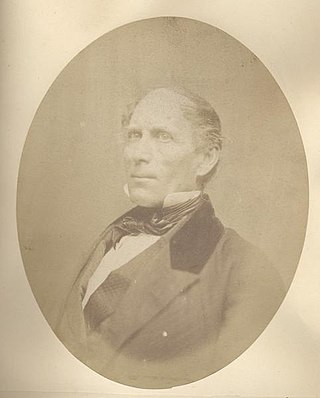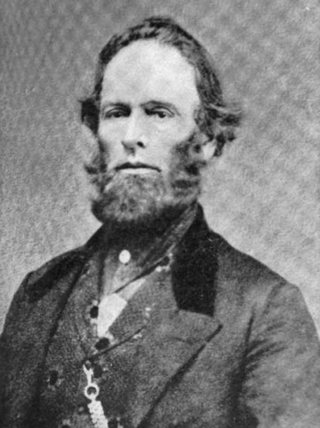
Christopher Latham Sholes was an American inventor who invented the QWERTY keyboard, and, along with Samuel W. Soule, Carlos Glidden and John Pratt, has been contended to be one of the inventors of the first typewriter in the United States. He was also a newspaper publisher and Wisconsin politician. In his time, Sholes went by the names C. Latham Sholes, Latham Sholes, or C. L. Sholes, but never "Christopher Sholes" or "Christopher L. Sholes".

William Augustus Barstow was an American businessman, politician, and public administrator. He was the third governor and second Secretary of State of Wisconsin, and served as a Union Army officer during the American Civil War. Before Wisconsin became a state, he was instrumental in the creation of Waukesha County.

Alexander Williams Randall was an American lawyer, judge, and Republican politician from Waukesha, Wisconsin. He served as the 22nd United States Postmaster General, during the administration of President Andrew Johnson (1865–1869). He previously served as the sixth governor of Wisconsin (1858–1862) and, as governor, was instrumental in raising and organizing the first Wisconsin volunteer troops for the Union Army during the American Civil War. He is the namesake of Camp Randall and Camp Randall Stadium.

Joseph Very Quarles, Jr., was an American lawyer, politician, and Wisconsin pioneer. He served as a United States senator from Wisconsin and a United States district judge for the Eastern District of Wisconsin. Earlier in his career, he was the 20th mayor of Kenosha, Wisconsin, and served as an officer in the Union Army during the American Civil War.

Charles Clark Sholes was a Wisconsin politician and newspaperman. He was the 8th Speaker of the Wisconsin State Assembly and 2nd Mayor of Kenosha, Wisconsin. He also served in the Wisconsin State Senate. His younger brother was Christopher Latham Sholes, the inventor of the typewriter.
Alfred Constantine Barry was an American educator, politician, and Universalist minister. He was Wisconsin's 4th Superintendent of Public Instruction and served one term in the Wisconsin State Assembly, representing Kenosha County. During the American Civil War he served as a Union Army chaplain and recruiter.
George Howard Paul was an American newspaperman, businessman, and politician. He was a prominent member of the Democratic Party in Wisconsin, served two terms in the Wisconsin State Senate representing southern Milwaukee County, and was the 5th Mayor of Kenosha, Wisconsin. He also served in various other state and local offices, including several years as a member and president of the University of Wisconsin Board of Regents.
Herman S. Thorp was an American farmer from Bristol or Cypress, Wisconsin, who served as a Free Soil Party member of the Wisconsin State Assembly from Racine County, and a Republican member of the Wisconsin State Senate from the 8th District.
George Bennett (1810–1888) was an American merchant and pioneer of Kenosha, Wisconsin. He was a member of the Wisconsin State Assembly in 1859 and of the Wisconsin State Senate from 1860 to 1861.

Frederick William Horn was a German-American immigrant, lawyer, politician, and Wisconsin pioneer. He served in many elected offices; he was the 4th, 7th, & 25th speaker of the Wisconsin State Assembly, and served a total of 14 years in the Assembly. He also served five years in the Wisconsin State Senate—including the first three sessions after statehood—and was the first mayor of Cedarburg, Wisconsin, serving seven years in that role. He generally identified as a Democrat, but was elected several times as an Independent.

Samuel Hale, Jr., was an American businessman, politician, and pioneer settler of Kenosha, Wisconsin. He served two non-consecutive terms in the Wisconsin State Assembly, and held various other local offices.
Otis Colwell was an American merchant and politician in the early years of the U.S. state of Wisconsin. He was a member of the Wisconsin State Assembly for the 1849 session, representing the village of Southport and southeast Racine County.

William Starr was an American educator, abolitionist politician, and Wisconsin pioneer. He served two terms in the Wisconsin State Assembly, representing western Fond du Lac County, and was president of the board of regents of the Wisconsin State Normal Schools for the last decade of his life.

The 1849 Wisconsin gubernatorial election was held on November 6, 1849. Democrat Nelson Dewey won the election with 52% of the vote, winning his second term as Governor of Wisconsin. Dewey defeated Whig Party candidate Alexander L. Collins and Free Soil Party candidate Warren Chase.

The 1853 Wisconsin gubernatorial election was held on November 4, 1853. Democratic candidate William A. Barstow won the election with 55% of the vote, winning his first term as Governor of Wisconsin. Barstow defeated Free Soil Party candidate Edward D. Holton and Whig candidate Henry S. Baird. This would be the last Wisconsin gubernatorial election in which there was a Whig candidate on the ballot.
William Bullen was an American merchant and Wisconsin pioneer. He was one of the first American settlers in what is now Kenosha, Wisconsin, and represented Racine County in the Wisconsin Territory's legislative assembly.

John Bullen V, commonly known as John Bullen Jr., was an American merchant, farmer, pioneer of Wisconsin and Minnesota. He was the founder of Kenosha, Wisconsin, and the namesake of Bullen Middle School in Kenosha. Later in life, he moved to Minnesota and served in the Minnesota House of Representatives.

The Twenty-Seventh Wisconsin Legislature convened from January 14, 1874, to March 12, 1874, in regular session.

The John McCaffary House is located in Kenosha, Wisconsin, United States. It was built in 1842 and was the site of the murder of Bridget McCaffary by her husband, John McCaffary. He was the first and only person executed by the State of Wisconsin before it abolished the death penalty in 1853. The house was added to the National Register of Historic Places (NRHP) in 1978.
Charles C. Clement was an American carpenter, newspaper publisher, Wisconsin pioneer, and abolitionist activist. He was a member of the Wisconsin Senate, representing Racine County during the 1855 and 1856 sessions. He was an early proprietor of the Racine Journal and played a significant role in the liberation of Joshua Glover. He was also one of dozens of lawmakers in the 1856 session caught up in the La Crosse and Milwaukee Railroad bribery scheme.













